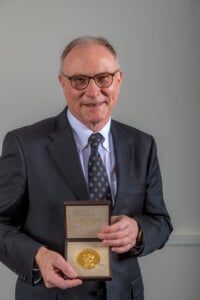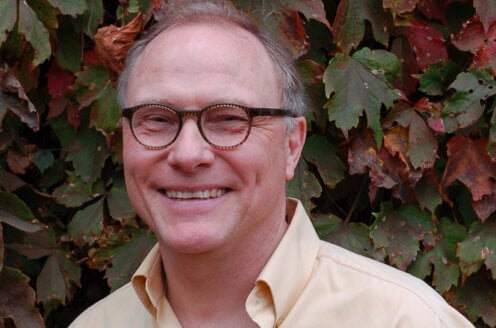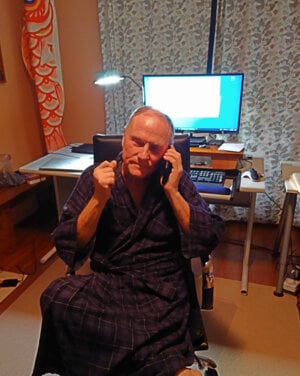“Most people who are doing economics who are going to be very successful are pretty nerdy”
Interview with David Card, February 2022
On 9 February 2022, nobelprize.org spoke to economist David Card about his first job, how he copes with failure and diversity in science.
You received the 2021 prize in economic sciences for your “empirical contributions to labour economics.” What was your first real job?

David Card with his prize in economic sciences.
© Nobel Prize Outreach. Photo: Paul Kennedy
David Card: If you grow up on a farm, you’re working when you’re eight or nine years old. You help out a little bit and then as you get older and learn to drive the tractors and have a little more independence. I had many of those kind of jobs. The first of the farm jobs I had, I would’ve been working for other farmers. Then eventually there was a local university near where I grew up and they had a huge research farm where they grew crops to try out and things like that. So I had a job there for a few summers.
Was there a single defining moment when you decided to pursue economic sciences?
Maybe in my senior year, my final year of college. At that time, at the university that I went to, economics used to be a much smaller subject than it is now. So even though there was a fairly large number of faculty, there were relatively few students. We had very ideal conditions. We had lots of faculty, and there was a small course where we learned how to write papers. I did my senior thesis on strike activity, at that time – in the 1970s – there were a lot of strikes in Canada and the United States, and I got interested in that topic. I found it interesting and we were using computers, which was somewhat more cumbersome than it is now. You had to type your programs on cardboard cards and then they would be read by the computer. There were a lot of other students working at the same time, some of whom I’m still friends with. There’s a certain amount of comradery doing that research. Then I decided maybe I would go to graduate school.
How would you say that we can encourage more diversity in the field of economic sciences?
Somehow, I would say in the last 10 years, at least in the United States, things have really changed. You can see that really all over the place. I’ve done some research on what kind of distinguished faculty receive special awards and the fraction of the awards that are going to women in economics and in other fields has really shot up. Having female scholars being recognised and shown as role models might have a positive influence.
A very long time ago in 1960s and 70s, there was definitely discrimination against female scholars. You can see examples of people who were passed over for these kind things. Things have really changed very much in the graduate education, so right now I think most of the top programs are virtually 50/50, so they are really reaching out and pushing hard to make sure that they stay close to 50/50, whereas even five years ago, that just wasn’t as much of a concern. So that has really come to the fore for reasons I’m not entirely sure of.
On the issue of minorities, that is an even worse problem. Graduating with a PhD in economics every year in the United States, there’s probably only four or five African Americans, a really low number. That’s caused by a number of factors, including real shortfall of people graduating from high quality universities in economics that are African American. So we’re not doing a very good job of keeping kids, especially highly talented minority kids, in economics and getting them through the bachelor’s program and then going onto a PhD. Now, on the other hand, it’s not entirely clear that going to do a PhD is the right thing if you’re that person, there’s a lot of other opportunities. For instance, going to law school might be pretty important for really talented minorities. We really need some of those people in the law profession. In the United States, everything is really run by lawyers. If you don’t have representation in the bar, you’re really in trouble and it’s going to change the way things go and we see that happening now, to some extent. So I think that that might be actually more of an emergency there than in economics.
What kind of qualities do you need as a person, if you want to be a successful scientist or researcher within the field of economic sciences?
Our profession, economics in particular, is very front loaded. It’s a little different than the hard sciences. So when people graduate with a PhD, they will have done a very original piece of research at that point. It’s not like they will have been engaged in a lab and helped their lab director and PhD advisor. They will have had to come up with their own independent research. There’s a huge amount of pressure on students to do that, which I’m not entirely sure that’s the right system, but that’s the system we have. There’s just an enormous amount of pressure and that pressure maintains until someone gets tenure. So that’s about eight, nine years of intense pressure coming at the end of the age 25 to 35. I think that basically people who can deal with a lot of pressure and put in enormously long hours, unfortunately that’s what’s required at that exact time. You can see right away, that’s a disadvantage for females because it means it’s going to cut right into time when they might reasonably think about starting a family.
Would you say that creativity, persistence and coping with failures are important traits for becoming successful in science?
All of those things, for sure. The hardest one of those is coping with failure, that’s difficult because most of these people with flawless resumes haven’t really had any failures yet. So that’s a little difficult. They’re going to probably be 25 to 28 years old by the time they have their first failure, which is when they don’t get a really good job from the PhD program. That can be a really difficult problem that some of the students are not equipped to deal with. Because they haven’t had any of that kind of failure before. Persistence – that kind of goes without saying, I think. It’s a high commitment field. Most people who are doing economics who are going to be very successful are pretty nerdy and working 12 to 15 hours a day, seven days a week with a few breaks here and there.

Portrait of David Card.
Photo: Jean Smith/UC Berkeley
How have you yourself coped with failures in your life?
Well actually I probably haven’t had any huge monumental failures. A lot of times the most standard problem that you have is that you work on a project you think that it’s really interesting and that the results are important and then other people don’t really care for it. I think the best antidote for that kind of problem is that, you know, there’s a new idea. So people are always looking for the new idea and thinking about, this is a really exciting project. And hopefully this one will really get people excited.
I heard that you like bikes and you also like woodwork. Can you tell me a bit more about what you like to do in your spare time?
I have a woodworking job and I make furniture once in a while, but the last couple of years, I haven’t really had much time. To tell you the truth, the Nobel Prize thing is kind of time consuming so I’ve kind of let that slide a little bit. But yeah, that’s something I enjoy doing, biking. I ride my bicycle to school, but that’s because there isn’t any parking on campus. Now I supposedly have a parking place from the university, but even then it’s faster to ride your bike than to drive your car.
Your co-laureate Guido Imbens, you have known for a long time, haven’t you?
I can tell a pretty good story. I’d come to Berkeley and I was sitting in my office and he gave me a call. I mean, I knew him reasonably well. He gave me a call and said, “David, I’m going to get married to Susan and she’s got a job at Stanford. I need a job at Berkeley.” Cause he was at UCLA at the time. So I said, “Okay, I’ll see what we can do.” It turned out to be really good because he was a great addition to the faculty at Berkeley and really made a huge positive impact. Unfortunately, he and Susan got a job offer to go to Harvard and they went but then they came back to Stanford.
How did you react when you heard the news about your prize? You came home very early in the morning and you just landed from a flight?

David Card’s wife Cynthia Gessele snapped this photo of him speaking to nobelprize.org immediately after he had heard the news.
Photo: Cynthia Gessele
I had just flown back from Canada visiting my mother. I drove from the airport to our house in Sonoma County, which is a little bit outside of San Francisco area. I got there about one o’clock, our time in the morning and was having a shower. My wife said, “Well, I just got a signal on my cell phone that there’s a message on her home answering machine.” And then she played the thing and it said, well, you know, they’re calling from Sweden. Then we thought that it was actually my friend from Canada playing a joke. Then we figured out that it was actually a real Swedish phone number.
This interview has been edited for length and clarity.
